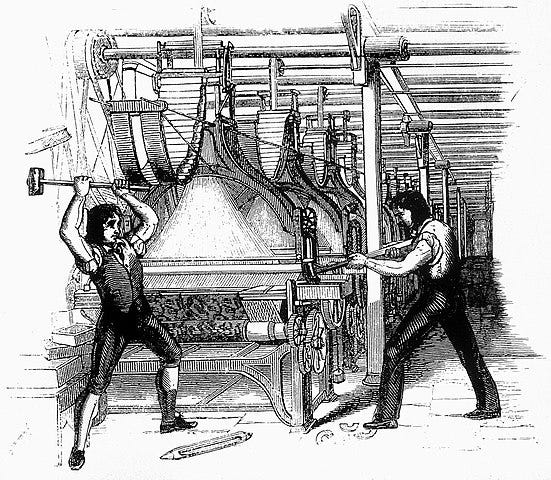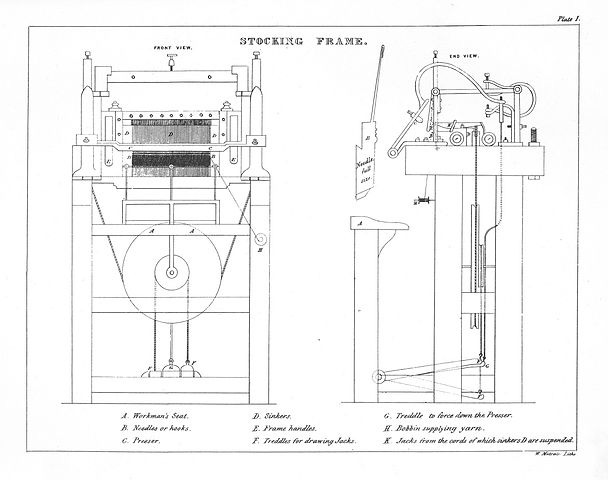Happened - And the shuttle exchanged for the sword
Here’s a little thought experiment. Let’s set the scene. You are a leader in an organization that produces good that are largely handmade. Not completely — the makers in your organization use machinery, but their end product requires a lot of skill as well. It doesn’t matter for our experiment what the product is. It might be wool sweaters, shoes, personalized mobile apps, birthday cakes, bicycles, or just about anything else. The makers work long hours to produce the goods, and while they’re not unhappy with their income, they’re not getting wealthy even though the level of skill they need for their work is considerable. You, though, are not one of the makers. Your role is, for want of a better word, administration and support. You make sure the right raw materials are on hand at the right time and available when the makers need them. You deal with the customers, taking orders and directing shipping. You’re also responsible for routing the money through the organization; the income from sales pays for the materials, the rent on the place the makers work, and of course it pays the makers. It pays you, too, and through an oddity of the organization how much it pays you is mostly up to you. And that’s an interesting question. You don’t actually produce anything; you’re not one of the makers. On the other hand if it weren’t for you, the whole organization wouldn’t function — or at least, it wouldn’t function the same way it does now. That’s the scenario. And now the new development that’s going to power our thought experiment. Some new machinery has become available. It could be used to automate some or all of the process your organization uses to produce goods. If it’s put into use so that it automates nearly all of the process, the quality of your end products is going to suffer. You’ll be able to produce a lot more, and you won’t need nearly as many makers in your organization. The ones who remain won’t need their master-level skills; they’ll just be doing basic machine maintenance and control. But the goods can be sold a lot more cheaply. They should be cheaper, of course, because they’re not nearly as good. But you figure that customers don’t really care about quality — or if they do, you can probably talk them out of it since you’ll be able to sell them something that’s sort of similar for a much lower price. Besides, the cheaper stuff wears out a lot faster, so your customers will be back pretty soon. But the machinery could also be used in a different way. It could help each maker be more productive while still producing quality goods. And that would give each of them an individual choice; they could choose to maintain their current level of income in much less time, and just have more time to themselves. Or they could work just as much and enjoy a significantly higher income. The outcomes for you look rosy no matter what. If you bring the machinery into your organization and use it to support the makers, there will be more money flowing through the organization, and thus you can almost certainly pay yourself more. On the other hand, if you bring the machinery into your organization and use it to replace the makers, there will be more money flowing into the organization, but less money flowing out, since there will be fewer makers. That means a lot more will be available for you. The thought experiment, obviously, is what do you do? Do you support the makers, or do you replace them? The default answer in our late-stage capitalist society has for a long time been that whatever machinery can be brought into an organization is used to replace the makers. The goods produced become cheaper in both senses of the term. Customers spend less money on each item, but the items are lower quality and need to be replaced more often. This process has gone on for more than a century, and by now landfills (and oceans) are filling up with broken, unrepairable plastic products that take the place of things like suits that were durable enough to be handed down across generations. Shoes that were made to be repaired when they got worn. Devices built out of components that could be replaced when they failed. The default answer has been our go-to solution for so long that it’s hard to realize that there really is a choice here. An organization could use machinery — automation — to keep every single person that’s a member (or an “employee”), but enable them to be more productive in the same amount of time, or alternatively be equally productive in less time. And grant them that time to use as they wish — the belongs to them, after all. They rose up and destroyed some of the equipment.You’ve probably heard the term “Luddite.” It arose in the 1700s in England when textile workers saw automatic weaving machinery being installed in factories and used to replace them. They rose up and destroyed some of the equipment, at least until the capitalist faction convinced government officials to stop the whole movement with cudgels, guns and prisons. But think about what that means. It means that the primary function of government, at least in that instance, was not to ensure the wellbeing of the biggest group of citizens. It was to ensure the enrichment of a minority. It also means that the primary function of a business organization was not to ensure the wellbeing of everyone that was part of it, but to bolster the enrichment of a small number of participants at the direct expense of others. It’s often said that “a business is not a democracy,” but that’s because of a choice. There’s nothing inherent to a business organization that dictates that it must enrich the very few at the expense of the very many, nor that it should produce shoddy, discardable products simply to arrive at the lowest possible short-term prices (and ignore the longer-term costs of that practice). That’s a choice too. Luddites are generally characterized as being “anti-techology,” but that was never their point at all. What they objected to was the conscious choice to use technology to enrich the few at the expense of the many. The choice to organize a business to enrich the few at the expense of the many. The choice to ally government with the enriched few at the expense of the many. You’ve probably heard of Lord Byron. He lived in the late 1700s and early 1800s and is still regarded as one of the greatest Romantic poets in history. But he was also a Lord — an English peer. That meant he was entitled to a seat in the House of Lords; the upper house of the English Parliament. And it was February 27, 1812 that he gave his first speech to the House of Lords. What he said was basically a version of our thought experiment. He spoke in support of the Luddites in his home county of Nottinghamshire. Maybe they should have listened more carefully. Thanks to Corey Doctorow, whose writing here sparked my thinking about this topic. The title and subtitle are taken from Song for the Luddites by George Gordon Lord Byron. |
Older messages
To love is to act
Saturday, February 26, 2022
Here is the battle between day and night
Nyet
Friday, February 25, 2022
And here's the nyet nyet
Same as it ever was
Wednesday, February 23, 2022
Same as it ever was
Talk amongst yourselves
Monday, February 21, 2022
I'll give you a topic: talk.
Tyranny is tyranny
Sunday, February 20, 2022
And nature is the most tyrannical of all
You Might Also Like
*This* Is How To Wear Skinny Jeans Like A Fashion Girl In 2025
Wednesday, March 12, 2025
The revival is here. The Zoe Report Daily The Zoe Report 3.11.2025 This Is How To Wear Skinny Jeans Like A Fashion Girl In 2025 (Style) This Is How To Wear Skinny Jeans Like A Fashion Girl In 2025 The
The Best Thing: March 11, 2025
Tuesday, March 11, 2025
The Best Thing is our weekly discussion thread where we share the one thing that we read, listened to, watched, did, or otherwise enjoyed recent… ͏ ͏ ͏ ͏ ͏ ͏ ͏ ͏ ͏ ͏ ͏ ͏ ͏ ͏ ͏ ͏ ͏ ͏ ͏ ͏ ͏ ͏ ͏ ͏ ͏ ͏ ͏ ͏
The Most Groundbreaking Beauty Products Of 2025 Are...
Tuesday, March 11, 2025
Brands are prioritizing innovation more than ever. The Zoe Report Beauty The Zoe Report 3.11.2025 (Beauty) The 2025 TZR Beauty Groundbreakers Awards (Your New Holy Grail Or Two) The 2025 TZR Beauty
Change Up #Legday With One of These Squat Variations
Tuesday, March 11, 2025
View in Browser Men's Health SHOP MVP EXCLUSIVES SUBSCRIBE Change Up #Legday With One of These Squat Variations Change Up #Legday With One of These Squat Variations The lower body staple is one of
Kylie Jenner Wore The Spiciest Plunging Crop Top While Kissing Timothée Chalamet
Tuesday, March 11, 2025
Plus, Amanda Seyfried opens up about her busy year, your daily horoscope, and more. Mar. 11, 2025 Bustle Daily Amanda Seyfried at the Tory Burch Fall RTW 2025 fashion show as part of New York Fashion
Paris Fashion Week Is Getting Interesting Again
Tuesday, March 11, 2025
Today in style, self, culture, and power. The Cut March 11, 2025 PARIS FASHION WEEK Fashion Is Getting Interesting Again Designs at Paris Fashion Week once again reflect the times with new aesthetics,
Your dinner table deserves to be lazier
Tuesday, March 11, 2025
NY delis are serving 'Bird Flu Bailout' sandwiches.
Sophie Thatcher Lets In The Light
Tuesday, March 11, 2025
Plus: Chet Hanks reaches new heights on Netflix's 'Running Point.' • Mar. 11, 2025 Up Next Your complete guide to industry-shaping entertainment news, exclusive interviews with A-list
Mastering Circumstance
Tuesday, March 11, 2025
“If a man does not master his circumstances then he is bound to be mastered by them.” ͏ ͏ ͏ ͏ ͏ ͏ ͏ ͏ ͏ ͏ ͏ ͏ ͏ ͏ ͏ ͏ ͏ ͏ ͏ ͏ ͏ ͏ ͏ ͏ ͏ ͏ ͏ ͏ ͏ ͏ ͏ ͏ ͏ ͏ ͏ ͏ ͏ ͏ ͏ ͏ ͏ ͏ ͏ ͏ ͏ ͏ ͏ ͏ ͏ ͏ ͏ ͏ ͏ ͏ ͏ ͏ ͏ ͏
Don't Fall for This Parking Fee Scam Text 🚨
Tuesday, March 11, 2025
How I Use the 'One in, One Out' Method for My Finances. You're not facing any fines. Not displaying correctly? View this newsletter online. TODAY'S FEATURED STORY Don't Fall for the




